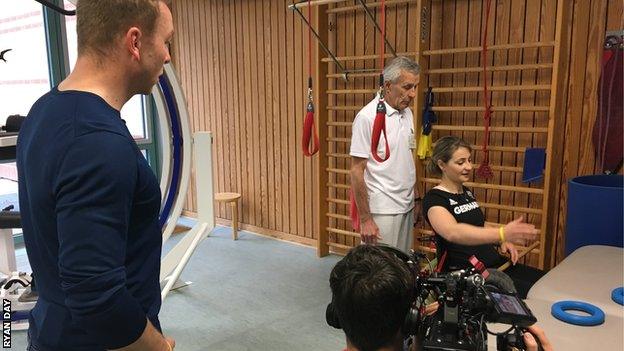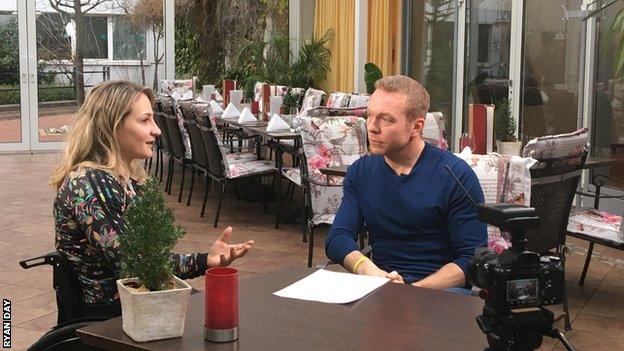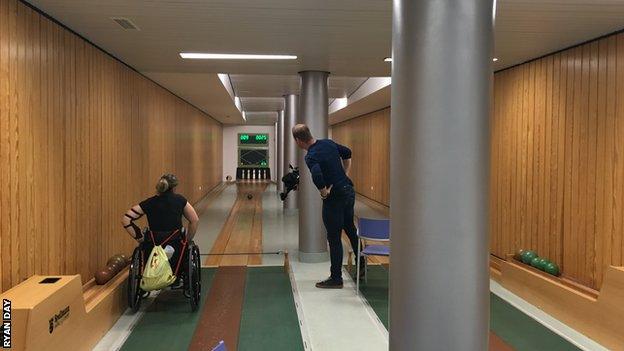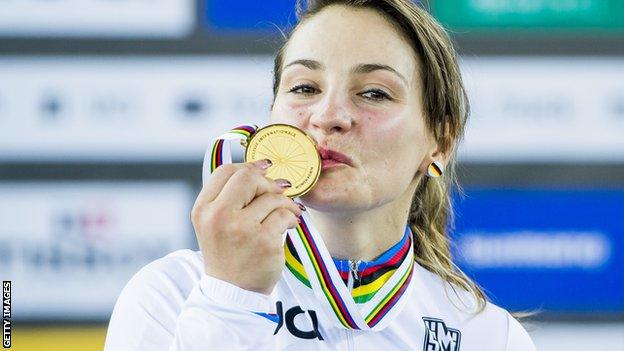Kristina Vogel: Sir Chris Hoy on interviewing 'an incredible human being'
- Published
- comments
Chris Hoy meets Kristina Vogel: From desperation to inspiration is available on BBC iPlayer from Friday, 1 March, 16:00 GMT.

I'm in a wheelchair, but it's not the end of my life - Vogel
The last time I saw Kristina Vogel she was on top of the world.
It was March 2018 and she had just equalled Anna Meares' record as the most decorated female track cyclist in World Championships history by winning an 11th gold medal.
Nothing could have prepared me for our next meeting 11 months later, watching at a hospital rehabilitation centre in Germany as - in a wheelchair - she struggled to lift a football and move it six inches.
When I think of Kristina, I think of her smile. As she stood in the middle of the Apeldoorn velodrome in her rainbow jersey at the 2018 Worlds, that smile stretched from ear to ear. It always did. She smiled whether she won or lost, but when she won it was extra wide.
Now I have another memory. Of a grimace. Just watching her slowly moving that ball from one position to the next. She had to lean forward to do it and the effort on her face... it was quite a shock.
Kristina's life changed forever on 26 June 2018.
It was just a normal training session at the Cottbus velodrome. Max Levy, one of the toughest rivals from my career, was also there. It was his 31st birthday and later that day he and Kristina were due to go go-karting to celebrate. They didn't make it.
As a former track cyclist I know only too well the risk of crashing. You don't dwell on it when you are competing but there are lots of moments when you are close to serious accidents. Sometimes you get away with it and sometimes you don't.
I saw Max as well as Kristina earlier this month and he took me back to how it happened. He knew straight away that this crash was different.
Most riders, experienced riders, if they go down in a crash and don't get up straight away then they know something is wrong. They've either broken a bone or they're concussed - something serious. Max heard the noise and realised it had been a big one.
He looked over and saw it was Kristina and she was just lying there. She had collided with a Dutch cyclist at close to 40mph.
He ran across. Normally within a few seconds you're up and checking your scars, seeing if you've broken a collarbone or a wrist. But she wasn't and he knew something was up.
He was then the one sitting there holding her hand while she recognised immediately that she was paralysed. She knew she couldn't feel her legs and she said to Max: "This is it. I am not going to be able to walk again."
Kristina told me that Max being there to hold her hand was the thing that calmed her. As long as he was there to hold her hand, she wasn't alone and that was the most important thing at that moment.
She described it to me as pressure building - it was just intense pain. To know straight away that she wasn't going to walk again must have been utterly terrifying.
For Max to be the person witnessing that first hand must have been life-changing and incredibly tough for him to deal with. For so many years I saw Max just as a rival and as someone I wanted to go out and beat on the track.
At London 2012 he was the man I was most worried about. He was the rider I beat by a fraction of a second to win my sixth and final Olympic gold in the keirin. Seeing him again, all of a sudden that history between us just didn't matter. It seemed so trivial.
The details of Kristina's accident were understandably kept very quiet at first. I sent Max a message and he told me in confidence it was really not good at all. He said that at that moment they were just hoping that she would have use of her legs again. That was when I realised how bad it was. Then a few days later he told me they were hoping she was going to be able to breathe by herself.
When you are hearing that sort of thing you are thinking, 'Oh my God, this is awful. This is nightmarish'. It was a really difficult day seeing Kristina in Germany earlier this month but I think I was actually more emotional when I initially heard the news.
If the BBC had asked me to come and film an interview with her straight after the accident, I probably would have really struggled. But in the eight months since, I had followed her closely on social media and had seen how well she was doing.
I've known Kristina for more than a decade but it was normally just 'Hey, how's it going?' at the track or the hotel or the airport.
We had about half an hour alone while the camera was being set up. We had some lunch and a coffee and that is probably the most we chatted about the accident itself.
She was very open and honest. She showed weakness. She said this is the toughest challenge ever, but what do you do? Lie in bed and do nothing each day? Or take it on and achieve what you can? She talked about having new goals and new things you can look forward to in life.
She talked about how lucky she felt to have support from all around the world to help get an adapted car, a new wheelchair and a new house that is going to be a bungalow with wider door frames and better access.
When you hear about someone being paralysed you just think, 'Oh my God, they are never going to walk again' but it is also all the practicalities once that initial shock has happened.
It's like, 'Right, how do I get on with the rest of my life? How do I get my freedom back without having to rely on someone to lift me on to the toilet?'
I am into my coffee so I was looking at a map trying to find a nice coffee shop nearby. But then it was a case of thinking, 'It's not about what beans they have and what machine they brew the coffee with. It's about can we get Kristina in? Have they got steps? Is there a ramp?'
Inevitably, after seeing Kristina, I thought about how I would I cope if it happened to me. What would I do? It is almost like your brain doesn't really let you think about it too deeply because it's too unimaginable. You have got a self-preservation switch that stops you from even going down that route.
As a parent I also started imagining what it would be like to be Kristina's mum or dad and to get the news that your child had had an accident like that. That is way worse than trying to imagine it yourself.
Imagining it from your own perspective is brutal but you just know that somehow you would just struggle through. But the thought of it happening to your own child? That was the only time she wobbled a little bit in our interview, when she talked about her mum and dad and her partner Michael. She was saying that she hated to see the pain she had put them through, which was just horrendous to hear.
Seeing Kristina has stayed with me in the days and weeks afterwards.
Since I got back to the UK my one-year-old daughter Chloe has started walking for the first time. I have found myself watching her and thinking, 'Right, that's you now, set for your life. You've got your freedom and you can choose whatever you want to do.' That has really brought into focus what Kristina is going through even more.
I took so much from our day together but it all just sounds so cliched and trite. It's hard not to sound like you're just repeating some sort of motivational tagline you read on Instagram.
We all have limitations in different forms. It could be financial, health-wise, work, family, whatever - there are things on the surface that limit what you can do. But it's about making the most of the situation you are in, no matter where that situation is on the spectrum. And just not complaining. Not moaning about the small things.
We all find ourselves doing that, moaning about trivial stuff that means nothing. Then you see the joy in Kristina's face when she can achieve a micro victory, whether it's moving the football six inches from left to right or getting her feet into her car and being able to shut the door.
There were times when you could see her frustration and there were times when she was able to laugh. I would be more concerned if she'd just been relentlessly positive and hadn't had any moments of frustration because I would have thought it just can't be like that.
Her positivity wasn't a facade that she had put up and wasn't just a front for the cameras. She was very honest and open. And incredible. An incredible human being.
Sir Chris Hoy was speaking to BBC Sport's Tom Reynolds.

Watch the interview in full:
Chris Hoy meets Kristina Vogel: From desperation to inspiration
Available on BBC iPlayer from Friday, 1 March, 16:00 GMT.


Vogel suffered her spinal injury during a 2018 training session

Vogel's physiotherapy involves building up strength in core muscles she has no control over

Vogel won 11 world titles, two Olympic gold medals and three European golds in her cycling career

Part of Vogel's physiotherapy involves using the hospital rehabilitation centre's own bowling alley

Vogel suffered her spinal injury when she collided with a Dutch cyclist who was practising his standing starts. She was travelling at close to 40mph
How to watch cycling's World Track Championships on the BBC
Venue: Pruszkow, Poland Dates: 27 Feb-3 Mar
Fri 1 Mar: 17:30-21:15 - BBC Red Button, Sport website and app, connected TV
Sat 2 Mar: 13:15-15:00 - BBC One, 16:00-19:15 - BBC Red Button, Sport website and app, connected TV
Sun 3 Mar: 13:00-16:00 - BBC Two, 11:00-12:15, 13:00-15:15 - BBC Red Button, Sport website and app, connected TV